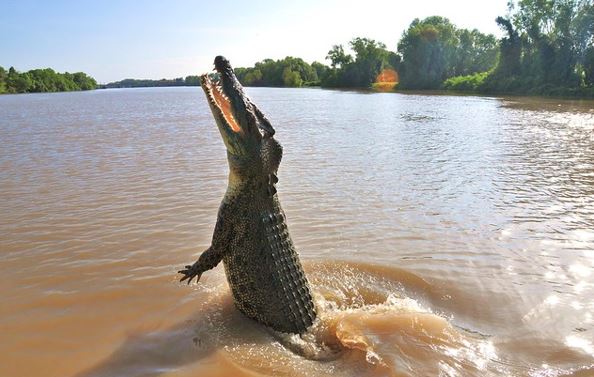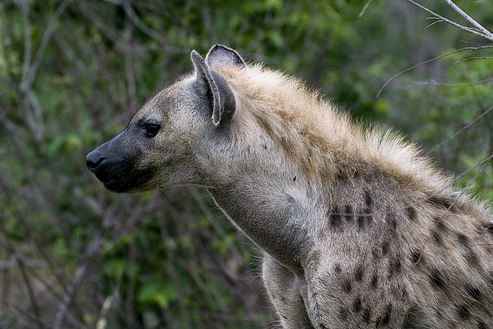The late Australian philosopher and ecofeminist Val Plumwood was attacked and almost killed by a saltwater crocodile in 1985. The fact she survived three ‘deathrolls’ is down to her sheer determination to escape and a good amount of luck. Severely injured, one leg was exposed to the bone, she somehow managed to walk and finally crawl to the nearest ranger station, some three kilometres away.
In her essay ‘Prey to a crocodile’, Plumwood writes that during the attack ‘I glimpsed the world for the first time “from the outside”, as a world no longer my own, an unrecognizable bleak landscape composed of raw necessity, indifferent to my life or death.
‘ … It was a shocking reduction, from a complex human being to a mere piece of meat.’

Human exceptionalism is the belief that we as individuals and as a species are separate and superior to all other life on earth. It is a belief innate in almost each and every human, especially those belonging to so-called developed societies, that stems from our almost complete domination of the planet’s landscapes and ecologies. We are the world’s most numerous large animal, and our technology has enabled us to travel from the deepest abyss to the surface of the moon. Some aspects of our technology are overwhelmingly prolific and invasive: plastic, for example, is now found from the highest point to the lowest point on Earth’s surface and throughout our own food chain.
Human exceptionalism partly stems from the way we historically treat the animals and plants with which we share the planet. They are the resources we need to survive and thrive, and we reshape entire ecosystems to sustain industries that provide those resources in the cheapest, most efficient and in the greatest amount possible. This has been at the expense of vast swathes of rainforest, wetlands and temperate forests, environments essential to the health of life on earth.
But as Val Plumwood discovered, it doesn’t take much to reduce a single human being from a member of the planet’s dominant animal to just another source of food.
#
In 2020, in the middle of South Africa’s first and strongest COVID-19 lockdown, I wrote a short story called ‘Speaker’ for a competition run by Sapiens Plurum, an organisation created to ‘inspire (humans) to aspire beyond what was humanly possible.‘
The competition’s theme was ‘how can technology increase empathy and connection?’ They wanted authors to imagine ways technology can improve how we relate to each other and bring us closer, even across species.
The idea for ‘Speaker’ came from one of those moments of serendipity – or perhaps synchronicity is a better term – when two ideas fuse to create a third idea. The first idea was based on the development of protein microchips, a scientific endeavour that had its research heyday in the 80s; one objective of the research was finding a way to help people suffering from brain injury to regain full health. The second idea is a personal fantasy, really to one day communicate with one of our hominin cousins, such as Homo neanderthalensis or H. ergaster. The fusion of these two ideas created the third idea: using linked protein microchips for communication between two modern species, Home sapiens and, in this case, Crocuta crocuta – the spotted hyena[i].
The story won the competition, and subsequently Sapiens Plurum asked Slate Magazine to consider publishing it. Slate agreed, and in January published it in Future Tense, a partnership between Slate, New America (a Washington-based think tank), and Arizona State University’s Center for Science and Imagination.[ii] Specifically, my story was part of series sponsored by the Learning Futures initiative out of Mary Lou Fulton Teachers College at ASU.
Stories appearing in Future Tense have a ‘response essay’ written by someone who is an expert in the field or issue covered by the story. In my case, I was fortunate to have Iveta Silova, an expert in global futures and learning, write the response in a piece called ‘If Nonhumans Can Speak, Will Humans Learn to Listen?’
As an extra bonus, Mary Lou Fulton Teachers College then arranged for an online discussion between Iveta, Punya Mishra, a professor and Associate Dean of Scholarship and Innovation at the college, and myself, on the creation of ‘Speaker’ and the issues covered by it and Iveta’s response. That discussion was recorded and subsequently uploaded to YouTube.
The discussion’s central issue turned out to be about human exceptionalism. As Iveta explains in her essay:
‘Today … we are forced to acknowledge that we are not so special after all. On the one hand, we wonder and worry whether artificial intelligence will become conscious, leading us down a dystopian spiral of human irrelevance. On the other hand, we see a major shift in scientific thinking about plant intelligence and animal consciousness, suggesting that the difference between human and nonhuman species is just a matter of degree, not of kind. Meanwhile, our hyperseparation from the natural world is threatening every species on Earth—including humans.’
Iveta goes on to write that ‘Overcoming the modernist assumption of human exceptionalism and reconfiguring our relationship with a more-than-human world is a complex and long-term project.’
In ‘Speaker’, linking humans with different species is an attempt to overcome human exceptionalism, but the exercise itself is fraught with difficulties, especially the hurdles imposed by our own innate prejudices and assumptions about what it means to be human in a world that seems to be so completely dominated by humans.
And this is where our hubris kicks in. For the most part life on Earth is dominated by viruses, archaea and bacteria, but we are so coddled by civilisation that even if we understand this intellectually, it is usually impossible to acknowledge it instinctively. The current Covid-19 pandemic, for example, has demonstrated that for all our technological and cultural achievements, our entire civilisation can be put on hold by a virus so small that all the world’s Covid-19 particles can be contained a single soft drink can. It is well to remember that in ancient Greek tragedies, hubris comes before a great fall.
Linked to that hubris is the assumption in the story that given the capacity to link our own minds with those of other animals, we will go ahead and do it. The story doesn’t engage with the ethical issues of communicating in such a way with another species. For example, what repercussions would there be for the recipient species? How do we stop the link resulting in one species overly influencing or even dominating the other? In fact, how would we even begin to estimate what impact there might be? And if the decision was made to go ahead and make the link, how do we deal with the issue of privacy? How do the two linked intelligences stop invading each other’s most private thoughts? Can thoughts be turned on and off like a tap, or would the link open a floodgate that would drown both parties in a wave of facts, emotions and random thoughts?
Perhaps most importantly of all, and in the context of ‘Speaker’ the most relevant, is how do we interpret those thoughts? How do we know for sure that our brains won’t ‘mistranslate’ the thoughts it receives, and vice versa? In the story this is handled with the ‘joking’ subtext, the way Akata and Samora try to find a way around their very different life experiences to reach a common understanding for the concept of humour, something humans but not hyenas possess (at least in the story).
And yet, despite all of these issues, I see linking with another species as a wonderful opportunity and a positive action at so many levels. In her responding essay, Iveta actually quotes Val Plumwood:
‘According to … Val Plumwood, we must reimagine “the world in richer terms that will allow us to find ourselves in dialogue with and limited by other species’ needs, other kinds of minds.” This is, she argues, “a basic survival project in our present context.”’
It’s time for humans to put aside their exceptionalism and hubris. Apart from the damage to the planet such an attitude encourages, it damages us, keeping us artificially apart from the rest of life on earth. We cannot flourish as a species by ignoring the fact that we, like spotted hyenas and saltwater crocodiles and for that matter centipedes and flies, are animals. We aren’t the endpoint of evolution, just one of its offshoots.
[i] An animal seriously misrepresented in human culture. The spotted hyena is an intelligent and extraordinarily social predator that lives in large troops dominated by females. And I do mean ‘predator’; despite its historic image as a scavenger, almost all its food comes from actively hunted prey and not from stealing some other animal’s kills.
